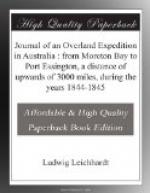July 29.—We travelled about five miles and a half south-south-east up the creek, and encamped in latitude 18 degrees 2 minutes. The character of the country was the same. When about two miles from our last camp, we came upon a tribe of natives fishing in a water-hole, near which a considerable quantity of large and small fish was heaped. The men made a tremendous noise, which frightened our bullocks, and hastened to the place where their gins were. The latter, among whom was a remarkably tall one, decamped at our approach. A fine shell of Dolium was in their camp, which we passed through. After we had passed by, the natives followed us; upon which I returned towards them, and hung a nose ring on the branch of a small tree. This sign of friendly disposition on my side, emboldened them to approach me and demand a parley. I, therefore, dismounted, and, accompanied by Charley, divided some empty tin canisters among them, with which they seemed highly satisfied. They were altogether fine men. Three or four old men with grey beards were amongst them; and they introduced a young handsome lad to me, with a net on his head and a quill through his nose, calling him “Yappar.” He was probably a youth of the Yappar tribe who had been sent forward as a messenger to inform them of our having passed that country. Seeing my watch, they pointed to the sun; and appeared to be well acquainted with the use of my gun.
Further up the creek, we again saw some storied gunyas of the natives.
July 30.—We travelled about ten miles west by south, over an immense plain, with here and there a solitary tree, or a small patch of forest. It was full of melon-holes, and much resembled the plains of the Condamine. Salicornia and Binoe’s Trichinium were wanting. At the west side of the plain, a green belt of forest stretched from north to south. Before we entered into it, and into the valley of the creek, along which it extended, we passed some open forest of stunted silver-leaved Ironbark. On the slopes of the plains we met, as usual, the raspberry-jam tree thickets, and on the flats and hollows along the creek, the clustered box; whilst, on the banks of the creek, grew the broad-leaved Terminalia and Acacia (Inga moniliformis). Following the creek up about half a mile, we found a fine rocky water-hole. The rock was a clayey Ironstone.
When entering upon the plain in the morning, we saw two emus on a patch of burnt grass. Brown and Charley gave chase to them; but Brown’s horse stumbled and threw him, and unfortunately broke the stock of the double barrelled fowling piece, and bent the barrels. Spring took hold of the emu, which dragged him to the lagoon we had left, pursued by Charley on foot. The emu plunged into the water, and, having given Spring and Charley a good ducking, made its escape, notwithstanding its lacerated thigh. Three harlequin pigeons, and six rose-breasted cockatoos (Cocatua Eos, Gould.), were shot on the plains.




